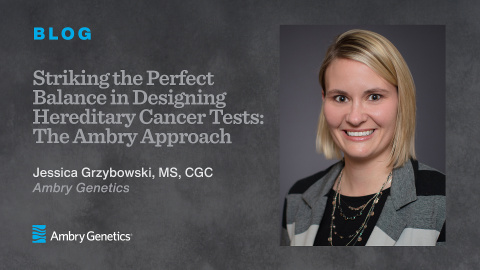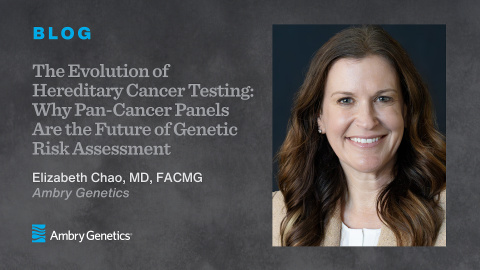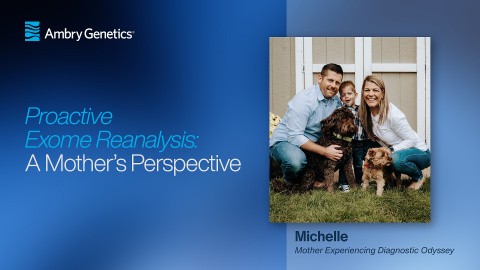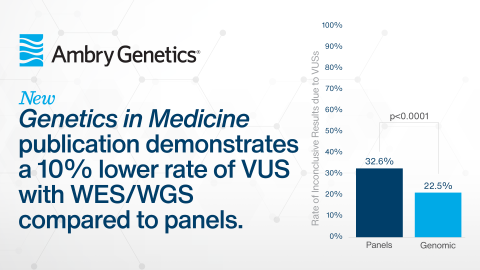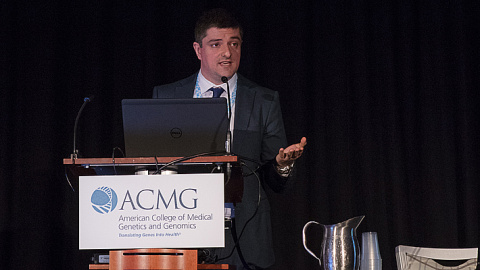- By Jessica Grzybowski, MS, CGC
- Posted October 31, 2024
Striking the Perfect Balance in Designing Hereditary Cancer Tests: The Ambry Approach
In the fast-moving world of genetic testing, designing and updating a hereditary cancer portfolio and each test it includes is a balancing act. It’s about making sure we include genes that matter clinically while steering clear of those with uncertain links to cancer. At Ambry, we’ve perfected this balancing act by sticking to a process rooted…
- By Elizabeth Chao, MD, FACMG
- Posted October 17, 2024
The Evolution of Hereditary Cancer Testing: Why Pan-Cancer Panels Are the Future of Genetic Risk Assessment
Hereditary cancer testing has changed dramatically over the past decade, reshaping how healthcare professionals diagnose and manage genetic risks. Initially, testing focused on specific genes like BRCA1 and BRCA2, linked to breast and ovarian cancers. These gene tests were quite limited, only looking at a small set of mutations…
- By Marcy Richardson, PhD
- Posted March 28, 2024
APC: New Takes on an Old Gene
A Brief History of APC The APC pathway was discovered in 1982 (more than 40 years ago!). APC is a tumor suppressor gene, meaning it helps the cell division process happen in a controlled way, which helps prevent tumor development. In 1991, Kinzler and Vogelstein discovered that pathogenic variants in the APC gene are…
- By Jennifer Herrera-Mullar, MGC, CGC, DMA
- Posted March 5, 2024
Greater than the Sum of its Parts: Gene-Disease Validity and Breast Cancer
One in every eight women will develop breast cancer in her lifetime.1 Considering there are 167.5 million women currently living in the United States,2 on a population level, that is a large number of women who will develop breast cancer. The vast majority of breast cancer cases are due to a combination of factors including, but not limited to:…
- By Carrie Horton, MS, CGC
- Posted February 23, 2024
Variant Interpretation in Real Time: Sometimes it Takes a Village
Every individual's genetic makeup is unique, containing the blueprint for their health, including susceptibility to diseases and potential response to treatments. But understanding your genes is like deciphering a complex code. DNA varies slightly from person to person, and interpreting the medical significance of those differences, or variants,…
- By Marcy Richardson, PhD
- Posted December 19, 2023
The Path to Clinical Relevance: What a Study on RAD51C Reveals about Resolving VUS
Everyone has genetic variation….and lots of it. It’s part of what makes us each unique. Genetic variation is defined by differences in our own genome and a reference genome. (The fact that there is only one reference genome selected to compare to all of our collective, rich, human diversity is a topic for another post.) Another source of genetic…
- By Nicole Teed
- Posted November 14, 2023
Peace of Mind: Michelle Majewski Trusts the Patient for Life Program to Share Answers for Her Son Owen
Like most working moms, Michelle Majewski is busy. She spends her days juggling a career as a sales account executive, managing a household, and spending quality time with her husband, their son Owen, and their two dogs. Owen, now 4 years old, is a charmer. He also has extra medical needs, without a clear diagnosis or explanation. The search for…
- By Meghan Towne, MS, CGC, LCGC
- Posted September 20, 2023
Genetics in Medicine publication demonstrates a 10% lower rate of VUS with WES/WGS compared to panels
Are uncertain results (variants of uncertain significance, or VUS) more likely in multi-gene panels (MGP) or whole exome- and genome-based (WES/WGS) tests? Ambry recently participated in a study led by the Medical Genomic Initiative (MGI) comparing the VUS rates for MGP and WES/WGS. The study, conducted across 19 clinical laboratories in North…
- By Tina Pesaran, MA, MS, CGC
- Posted August 23, 2018
5 Things You Need to Know about Ambry’s Variant Review Process
As a healthcare provider, you most likely hope for a genetic testing result that provides some kind of clear answer about what to do next. However, sometimes genetic testing will reveal a variant of unknown significance (VUS), which can be a challenge for both you and your patients. These variants are sort of “innocent until proven guilty”…
- By Jackie Connor
- Posted March 30, 2017
Dr. Rachid Karam Discusses Variant Classification at 2017 ACMG Annual Meeting
Actionable medical results are often a key component in deciding a patient’s medical management and specialized treatment options. However, some genetic test results can have unclear implications or Variants of Unknown Significance (VUS), which can often affect a clinician’s medical management plans for their patients. During the 2017 ACMG…
